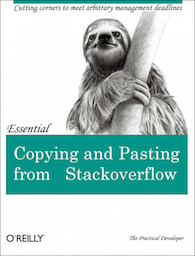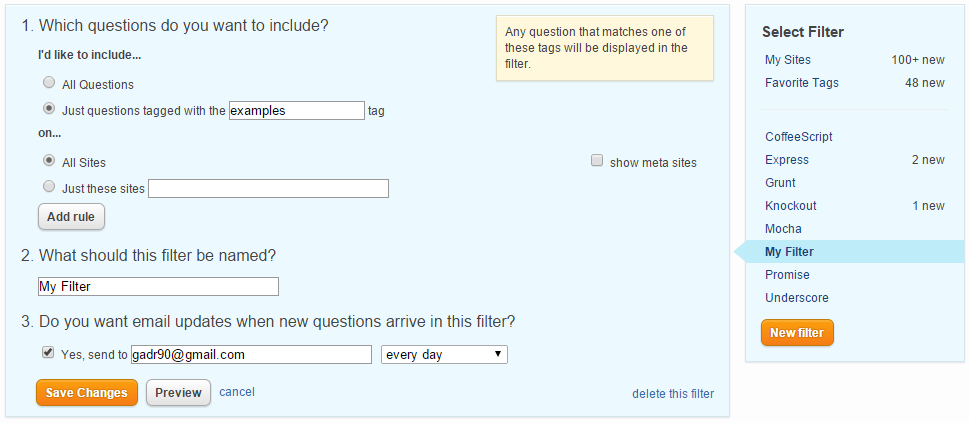Stack Overflow Habit
 Stackoverlow has already become an indispensable tool for many developers. The use model promoted by the authors is a “knowledge base”. We type the question in Google → get on stackoverlow → read the answer → profit! This is how the site works for most - at the expense of a much smaller group of developers who answer questions. Why are they doing that? Most - to improve their own skills and social implementation. And it is useful for a career, and the complexes bypass the party, and the middle age crisis will not come. Under the cut - translation of the article of one such developer, who shares his practical insights on how he managed to answer the questions of novice developers every day.
Stackoverlow has already become an indispensable tool for many developers. The use model promoted by the authors is a “knowledge base”. We type the question in Google → get on stackoverlow → read the answer → profit! This is how the site works for most - at the expense of a much smaller group of developers who answer questions. Why are they doing that? Most - to improve their own skills and social implementation. And it is useful for a career, and the complexes bypass the party, and the middle age crisis will not come. Under the cut - translation of the article of one such developer, who shares his practical insights on how he managed to answer the questions of novice developers every day.Developers spend a huge amount of time on Stack Overflow. I was very lucky that the beginning of my career coincided with the opening of this site in August 2008. And I could get answers to all the questions that novice developers usually ask.
Last year, I set a goal to return the “debt” to the community - and to participate more actively in the work of Stack Overflow. It was important for me to stop being a “simple consumer” of information and start sharing what I learned over the years. To do this, I created accounts on the necessary sites of the Stack Exchange and began daily to look through unanswered questions.
I had enough for a few weeks.
')
Goals too easy to fail
As James Clear eloquently explains , setting goals for yourself is not enough. The goal is too abstract thing, our brain is not evolutionarily adapted to work with such. He is fit to work with habits and rituals.
Follow the process, not the goals.
It is so simple that it hurts. You can't devote yourself to “paying the community good”. You can devote yourself to answering one question every day.
Bird on the grain pecks. Pelican bird, twice its weight
So, what kind of system will help answer questions? The phrase Brian Tracy comes to mind:
The best way to fight procrastination is to make everything necessary for work ready in advance.
What is needed to answer the question? Questions!
Filters rush to the rescue
I present to you the most useful feature of the Stack Exchange - filters.

If you are logged in to the Stack Exchange, you can go to the filters on this link . You can create a named filter for questions with one or more specified tags. But more importantly, you can subscribe to new questions that satisfy your filter! And you will receive a daily digest in the mail. Thus, if you already have a good habit of checking email every day, then using filters you automatically upgrade it to the habit of viewing new questions on the Stack Exchange.
Filter by meaningful tags
Filters are good, but plenty. Too many questions. To focus on the ones that you really want to answer, use the most specific tags.
For example, instead of the generic “JavaScript” tag, try using the name of the framework, library or development technique that you recently worked with. The more specific your filter is, the greater the chance that you can easily answer a question and help someone.
Filter mailing is just the beginning.
It is important to remember that the mailing list is just a small cheat. A simple way to remind yourself every day about Stack Overflow.
If you use any system to manage tasks - try to add Stack Overflow to your daily tasks list! Personally, I use a physical notebook and get great pleasure by ticking “Stack Overflow” every day.
How to give good answers: a small instruction
Ok, now you have a reminder to go to Stack Overflow every day and see who needs help. But how to provide this assistance?
Do not answer if you are not sure
The easiest way to lose time and get negative emotions is to answer a question that you are not sure about. If you do not know the answer or, more importantly, can not demonstrate a working example - just do not bother with this question.
First, you will lose the time to create things that have nothing to help the questioner. Secondly, you are likely to catch negative voices if your “attempt to guess” turns out to be wrong.
There is no need to cling to a specific question - look a little more at other questions, and after a while you will find the perfect question for yourself.
Use Fiddle
Conclusion from previous advice: wherever possible, use services such as CodePen, JSBin or JSFiddle to show a working illustration of your answer. This greatly increases the chances that your answer will be accepted, as the author of the question will be able to verify in a simple way that your proposal works.
Link to your sources
If for the answer to the question you studied the documentation or delved into the source code - do not forget to give references to what was dug out. This will add “credibility” to your answer and will explicitly show that you have not invented anything.
How it all works for me
When I started using the described system, I had 35 reputations and 3 answers. Now, in just two weeks, these numbers have increased 12 times (431 responses).

Of course, by and large, these numbers mean nothing. It means that I was finally able to create a habit of making a contribution to the community and helping new developers.
And hopefully this article will help you do the same!
Source: https://habr.com/ru/post/281845/
All Articles